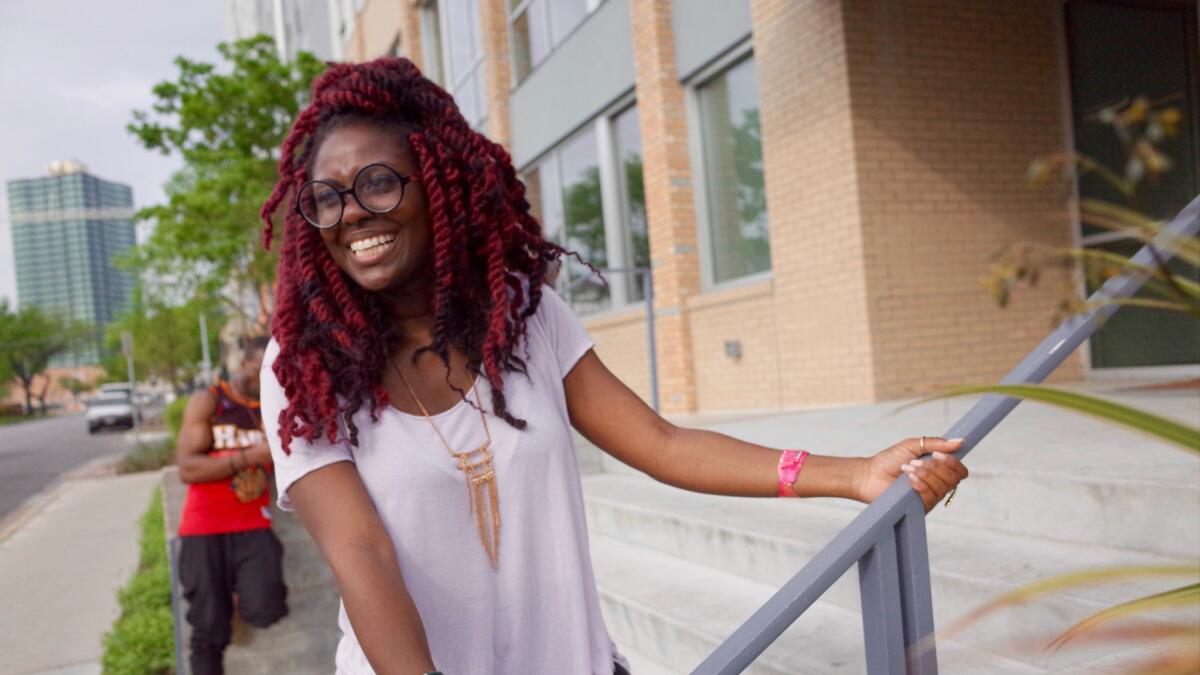Commentary: Sammus’ hip-hop song about depression and suicidal thoughts that made me cry
- Share via
There’s no crying in hip-hop. Especially not at a concert.
But there I was, standing at the back of a cramped venue at this year’s South by Southwest festival, doing just that. I don’t like crying in public, so it wasn’t much solace that a good half of the room was doing the same thing.
Including the person on the stage.
Sammus, a rapper from Ithaca, N.Y., was performing “1080p,” which was at that point her newest single. I’d already watched the video about 10 times that morning.
_________________
Note that the video below contains vulgarities.

And I’d read the reviews — writers have called the song “important,” “honest” and “powerful.”
I agree. It’s a great track. But I wasn’t crying because it’s a “powerful” song. I was crying because I was angry.
“1080p” is about relationships, school and life, but it’s mostly about Sammus’ battle with depression, pills and thoughts of suicide.
For the past five years, I’ve considered Sammus a friend. We shared a tightknit circle of friends at Cornell University, where we attended graduate school. We were in the same student organization. I even made a cameo appearance in one of her music videos.
So why was I first hearing about my friend’s pain via a performance in a roomful of strangers?
I imagine that even the hardcore fans of hers in the room were a little surprised. Sammus isn’t really known for songs like this — she’s most famous as a “nerdcore” rapper.
Nerdcore is as much a subgenre of hip-hop as it is a subgenre of nerd fandom. The definitions for it are pretty loose, but the music generally involves rapping about things like “Star Wars,” comic books or video-game characters. Sammus’ work takes it a step further than most — she’s done entire projects based on video game story lines and regularly samples old-school video game tunes into rap instrumentals.
She even wears an arm cannon at her shows, in homage to Samus Aran, the video game character who is also the source of her name.
The nerdcore label is a blessing and a curse for Sammus. It’s a curse because a lot of nerdcore rappers aren’t actually very good. They’re entertaining, but only in an ironic way. You could say that by associating herself with the nerdcore scene, Sammus (who can rap circles around a lot of artists and also produces her own music) is limiting her ability to appeal to mainstream audiences.
But the nerdcore blessings are bountiful for Sammus. In a landscape where indie hip-hop artists are lucky to find venues that will let them perform “for exposure” (that is, for free), Sammus has no problem booking paid gigs. This year alone, she appeared at game culture conventions like PAX East and Magfest, performing for crowds of a thousand people or more.
She pulls in extra dollars by selling CDs or posters after her shows. Unlike traditional hip-hop crowds, who seem to feel that a fist-bump is adequate payment for a free concert, nerdcore fans are generally more supportive and more willing to put money toward making sure that their favorite artists are able to continue to create.
And anyway, Sammus has no reason to distance herself from her nerdiness. Her room is adorned with Teenage Mutant Ninja Turtles posters, and one of our first conversations was an argument about whether blowing into Nintendo cartridges is a good idea (for the record: it’s not).
So where was all this pain coming from in “1080p”? And why had she been hiding that pain from me?
After the concert ended, I called Sammus and asked her to tell me more about her song.
It turns out that throughout 2013 and 2014 Sammus was suffering from depression. A difficult relationship, health troubles and the isolation of being a black graduate student at an Ivy League institution were taking their toll on her. Then after surgery on her sinuses she was prescribed painkillers. At first the pills were distracting because the numbing effects on her body made it hard for her to focus on her work.
But soon she found solace in the numbness.
Sometimes, when she was having a day that she couldn’t handle, she would just take a pill and zone out. With time, those days became more and more frequent.
“I was a zombie for so much of my graduate school experience,” she said.
Twice, she was hospitalized and had to lie to the doctors when they asked if she was trying to hurt herself.
The first time, the doctors believed her. The second time, they didn’t.
Eventually, she sought help. She is now seeing a therapist, who she even name-checks in the credits for her song.
After she shared much of this story, she asked me a question that wasn’t easy to answer. She asked what I thought of the song. I told her the truth: I felt betrayed. And I felt angry.
She paused. She told me that she understood. She told me that she wasn’t surprised.
“I’ve had a lot of people tell me they feel guilty for not realizing what was happening to me,” she said. “But that just shows the lengths I took to insulate myself. I did a lot of work to make sure that nobody knew what I was struggling with. I knew you would never judge me. But I just wasn’t ready to have those conversations. Not with you, not with anybody. I was very intentional about projecting myself as a very happy-go-lucky person.”
Suddenly, my anger made sense.
Psychologists say that anger is a “secondary emotion” — something we use to cover up more vulnerable emotions that are harder to deal with, like guilt or fear.
I realized that the anger was just a mask for the guilt I was feeling. If I was a better friend, maybe she would have told me, I thought. If I wasn’t so preoccupied with my own problems, maybe I would have noticed something.
And deeper still, I realized the anger was a mask for fear: Do I have other friends who are struggling without my realizing it?

As hot a topic as mental health has been for the last few years, people of color are often left out of the conversation. Black people, for example, are 20% more likely to experience serious mental health problems than the general population. A National Institutes of Health study found that black women between the ages of 49 and 55 are biologically 7.5 years “older” than white women in the same age group, an effect the study partially links to the stress of simply existing as a black woman in America.
Despite this, black people are much less likely than whites to seek professional help. This is sometimes linked to a need to appear “strong” or an aversion to seeking help. Alternatively, it’s also been linked to a lack of access to good healthcare or even a bias of doctors, who may misdiagnose black patients.
Fortunately, the stigma around mental health in the black community is changing. In an article for Buzzfeed, writer Terrell Jermaine Starr opened up about his own struggle with depression and how he was Googling suicide methods when a friend saved him. Another writer named Imade Nibokun has an entire site, Depressed While Black, devoted to sharing stories about depression in the black community.
And for all her quirks as a nerdcore rapper, Sammus is following a tradition. Depression has always been a central topic in hip-hop, even if the music media spotlight on that fact is a recent phenomenon.
Sammus says that she isn’t comfortable being viewed as a “spokesperson” for mental health. “I don’t know if this is a distinction that needs to be made,” she told me, “but I was responding to my external environment and feeling like I had no control. That’s different from people who have been dealing with these issues throughout their lives.
“But that doesn’t take away from the fact that I seriously wanted to end things. I cry every time I perform ‘1080p’ because I remember that feeling.”
Sammus may not want credit for bringing these issues to light, but that is probably out of her hands. There’s a reason that she is invited to speak at technology conferences or teach online classes on structuring rhymes in hip-hop songs. She has a gift for getting a message across.
This is why her position as a nerdcore rapper is so unique. Some of her most ardent fans prefer her game-inspired tracks, like “Cybernetic Armor.” Others are more interested in songs like “Three Fifths,” in which she raps about racism and police brutality. Some are equally excited about both. This took her time to realize, she says.
“For a while, I was hesitant to rap about my experiences as a woman, as a black woman, and thought I had to keep that in the background and just focus on games.”
But her experiences with depression have given her work a new immediacy and opened her eyes to the effect she is having on people who see her as a role model.
“Someone pointed out to me that they noticed that most of the people coming up to buy merch were women,” she said.
“They wanted to support me. In hip-hop, women are usually framed as the competition. But I think women, especially black women, say that ‘She’s speaking to and for me, so I want to support her.’ It’s so cool.
“I’m not really doing this on purpose, but I guess just by being me, I can give different people different messages through my music.”
Even if the message is just that it’s OK to cry at a rap show.
Follow me @dexdigi for more on the intersection of culture and the Internet.
More to Read
The biggest entertainment stories
Get our big stories about Hollywood, film, television, music, arts, culture and more right in your inbox as soon as they publish.
You may occasionally receive promotional content from the Los Angeles Times.









